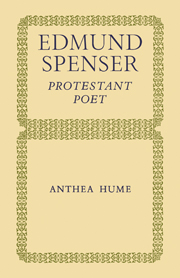Summary
Spenser was not the only Renaissance pastoralist to combine eclogues on ecclesiastical themes with eclogues on love and poetry in a single volume; but no poet besides Spenser had arranged so pointed an alternation of the two sorts of eclogue throughout the middle section of a pastoral work. Petrarch had treated ecclesiastical subjects under the pastoral veil in the Bucolicum Carmen as well as political, literary and personal ones, but his sequence was built up over a period of years from 1346 to 1352, and displayed above all the range of interests of an exceptionally cultivated man rather than a concern with patterned alternation. Mantuan had written eclogues about love and eclogues on ecclesiastical subjects; but in his volume six eclogues on love, poetry and town life are succeeded by a final four on religious vision, monasticism, and corruption in Rome – so that the effect is of a decisive shift from the secular to the religious world. Barclay and Googe, for their part, touched on ecclesiastical themes only briefly and with something of the air of a digression, within one or two eclogues. Googe, certainly, ended on an emphatically religious note, but this was not because church affairs had figured largely in his collection, but because the pessimistic vision of romantic love which he had projected throughout the series culminated in the stern advice to renounce earthly love and to love God alone.
In the organisation of its materials The Shepheardes Calender differs from all of these predecessors. Spenser's ecclesiastical eclogues are evenly distributed through the central section of the sequence – ‘Aprill’, ‘Maye’, ‘June’, ‘Julye’, ‘August’, ‘September’.
- Type
- Chapter
- Information
- Edmund SpenserProtestant Poet, pp. 41 - 56Publisher: Cambridge University PressPrint publication year: 1984
- 1
- Cited by



